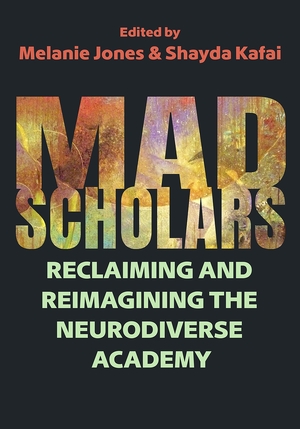"We have lots of personal experience, and lots of scholarship, showing us how ableist academia is and has always been. But this collection instead reveals the power and potential of disabled academics, who are already reshaping and reimagining higher education. This power is reflected in the diverse methods and forms across these twenty-three chapters; this potential can be harnessed by readers like you."—Jay Dolmage, author of Disability Rhetoric
"Mad Scholars critiques academic culture’s entrenched ableism and sanism and shows how difficult—still—it is to be recognized as having a positive, credible, valuable Mad subjectivity. The diverse voices in this book give us pathways for leading with care, both for ourselves and others. They reimagine academia. They tell us that our institutions can do better. This is a collection we need."—Elizabeth Brewer, Central Connecticut State University
Description
As universities rethink their approaches to student and faculty mental health, this volume showcases academics who openly and proudly embrace the identity of “Mad scholar.” In twenty-three essays—from contributors working in nearly a dozen disciplines and across three continents—Mad Scholars explores how neurodivergent scholars’ work and lived experiences are richer because of their difference, not in spite of it. In doing so, these essays both expose the deep-rooted ableism that undergirds traditional mental health interventions and envision a more rigorous, more inclusive, and more outward-facing future for scholarly community and engagement, within and outside traditional academia.
A long-awaited corrective by scholars accustomed to having their stories told for them, this collection draws on Mad perspectives at the intersection of various marginalized identities, boldly dreaming of a future where all students and educators can thrive. By offering concrete steps and strategies that radically reimagine the current academic landscape, Mad Scholars opens our eyes to much-needed innovations in research, pedagogy, and community, ones which promise to transform higher education and create vital paths for scholarly innovation.
Table of Contents
Introduction: Naming Ourselves Mad
Part One. Mad Pathways, Mad Exits
1. Don't Call it "Mental Health" - A Discussion on disability Euphemisms and Disability Community
2. My PhD Drove Me Crazy (but I Was Already Mad)
3. Complaint as a Maddening Practice (Moving through the University as a Mad Grad Student)
4. Rest as Feminist Disability Praxis, or How to Write While Flaring, Depressed, and totally Burned Out
5. Diary of a Mad Black Woman in the Academy
Part Two. Researching the Self
6. I'm Too Crazy for a Job - Thoroughbreds, Fuckups, and Autistic, Mad, Disabled, Femme Grassroots Intellectual-Freedom Portals
7. Embrace the Lie - Seeking Truths through Reading, madly
8. The Madmotherscholar in Academia and Beyond
9. In-Cite - The Mad Possibility of Interethnography
10. The Subject is Mad
Part Three. Disclosure and Disruptive Pedagogies
11. Mad Lyrics - Toward an Embodied, Community-Responsive Pedagogy of Care in Academia
12. Mad Pedagogy in Disabling Academia
13. Teaching for Mad Liberation: Crip Dreaming toward a Transformative Pedagogy of Madness
14. Learning and teaching Bad as Resistance: Queer Crip Pilpinx Bad Pedagogy
15. "The Deadly Space Between" Toward and Mad Pedagogy and Mad Methodology
16. Crazy Femme Pedagogies: Toward an Archive
Part Four. Mad Imaginaries, from Kinship to Community
17. Mad Resilience, Mad Kinship: Alternative Responses to Student Mental Health Crises
18. Anchoring in Mad Solidarity
19 Mad Laughter: On Finding and Forming Graduate Communities through Memes
20. On Mad Advantage, Redux: Covering, Passing, Negotiating (in) Higher Education
21. Landing without Failing: The Fucking Blue Dots
22. Orienting toward Togetherness: A Mad Phenomenology
About the Author
Melanie Jones received her Ph.D. in Comparative Literature from UCLA in 2021. She has published on Mad Studies, International Medical Humanities, Trauma Studies, and Horror Studies, and has taught for UCLA and the Bard Microcolleges.
Shayda Kafai is associate professor of ethnic and women's studies at California State Polytechnic University. Her work has appeared in the Journal of Lesbian Studies and Women's Studies Quarterly.
August 2024




